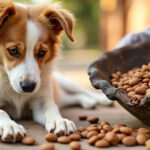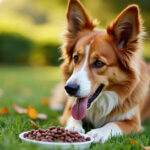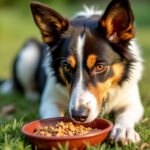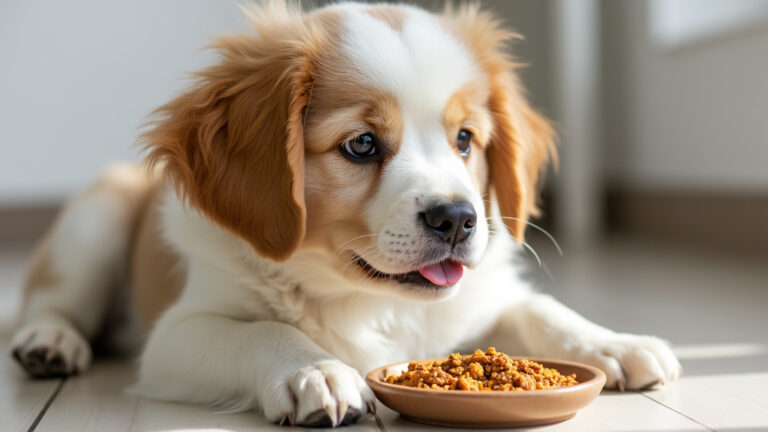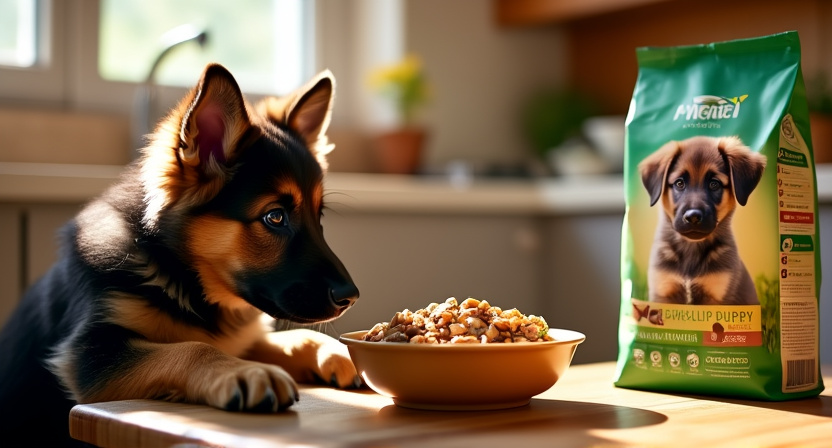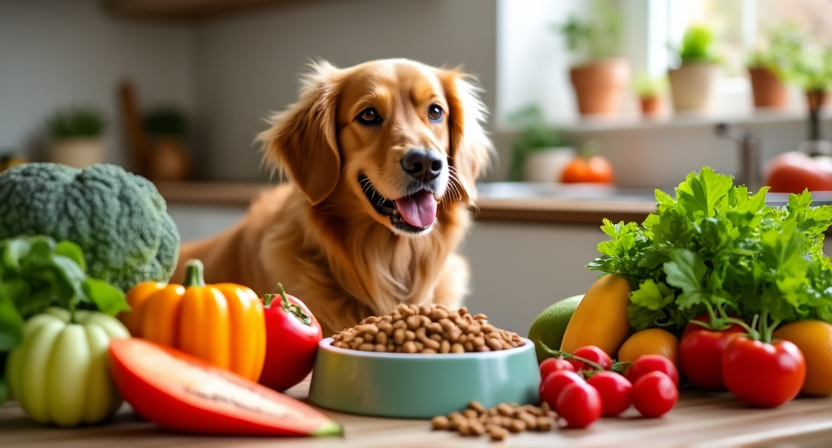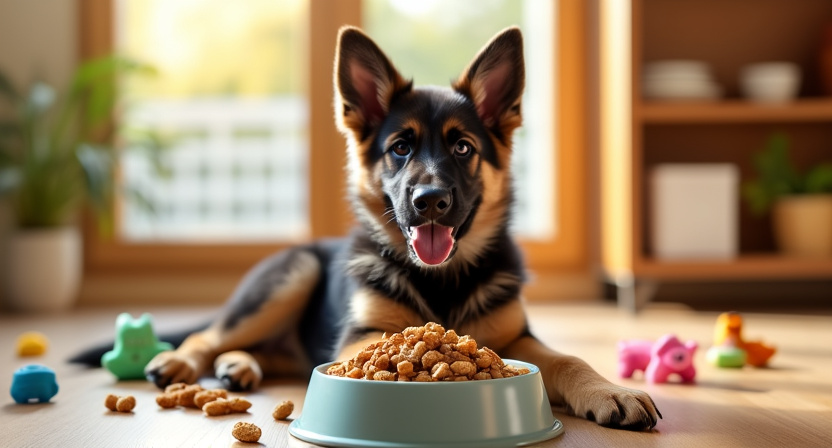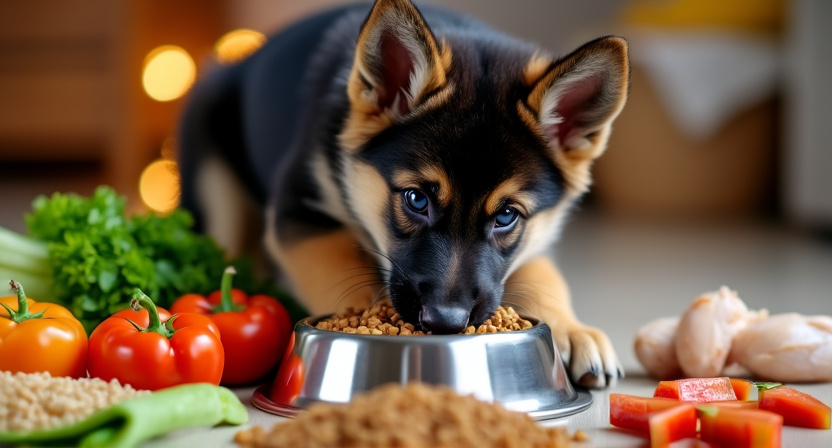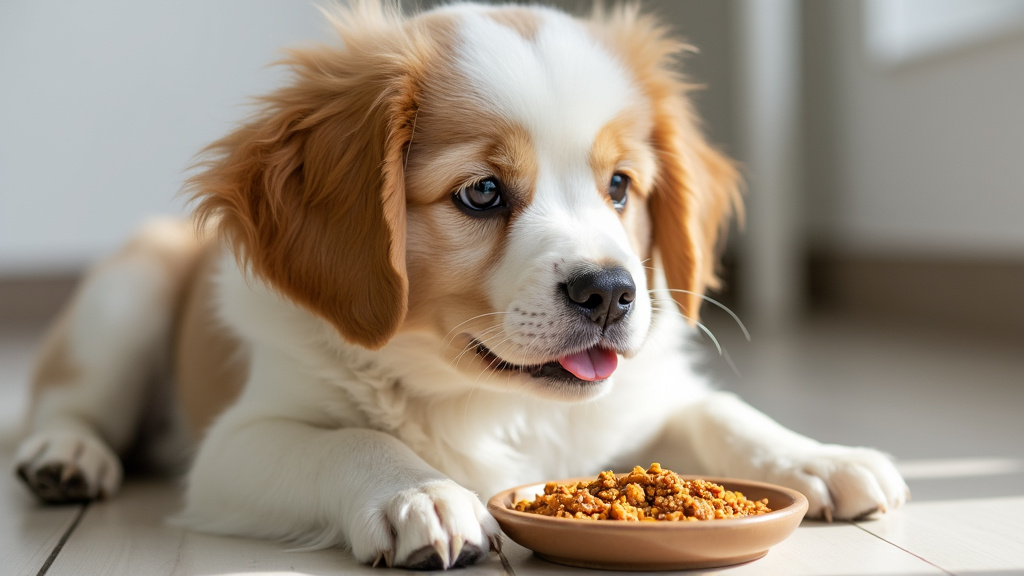German Shepherd puppies need a well-balanced diet to fuel their rapid growth and prevent bone issues. High-quality protein, appropriate fat content, and key nutrients like calcium, phosphorus, and DHA are vital for their development and health.
Table of Contents
ToggleKey Takeaways:
- German Shepherd puppies require 25-30% high-quality protein and 12-16% fat in their diet
- Balanced calcium and phosphorus levels are critical for proper bone development
- Top recommended foods include Royal Canin German Shepherd Puppy Food and Hill’s Science Diet Large Breed Puppy Food
- Dry kibble provides convenience and dental benefits, while wet food can be easier for younger puppies to eat
- Transition to adult food should happen between 12-24 months, based on the individual puppy’s needs
Nutritional Needs of German Shepherd Puppies: Fueling Healthy Growth
German Shepherd puppies need a carefully balanced diet to support their rapid growth without causing skeletal issues. I recommend focusing on high-quality protein sources, making up 25-30% of their diet. Fat content should be between 12-16% to provide energy for growth. It’s crucial to maintain balanced calcium and phosphorus levels for proper bone development. DHA is essential for brain and eye development, while vitamins A, D, and E support overall health. I also suggest looking for food with glucosamine and chondroitin to promote joint health. These nutrients are vital for your puppy’s development:
Key Nutritional Components
- High-quality protein (25-30%)
- Balanced fat content (12-16%)
- Calcium and phosphorus
- DHA
- Essential vitamins (A, D, E)
- Glucosamine and chondroitin
Top Recommended Dog Foods for German Shepherd Puppies
Premium Nutrition for Growing Shepherds
I’ve found several top-tier options for German Shepherd puppies that’ll support their rapid growth and development. Royal Canin German Shepherd Puppy Food stands out with its focus on digestive health and bone development, crucial for this large breed. Hill’s Science Diet Large Breed Puppy Food offers balanced nutrition and comes highly recommended by vets.
For high-quality protein and essential nutrients, Purina Pro Plan Large Breed Puppy Food is an excellent choice. Blue Buffalo Life Protection Formula Large Breed Puppy is known for using high-quality ingredients, ensuring your pup gets the best start in life. Eukanuba Large Breed Puppy Food rounds out the list as a well-regarded option for large breed puppies.
Nutritional Breakdown
When selecting food, it’s important to consider the nutritional content. For instance, Orijen Puppy Large provides:
- 43% protein for muscle development
- 18% fat for energy
- 31% estimated carbs for balanced nutrition
These percentages ensure your German Shepherd puppy receives the right mix of nutrients for healthy growth. Remember, each puppy is unique, so consult with your vet to determine the best food for your furry friend’s specific needs.
Types of Dog Food: Choosing the Right Option for Your Puppy
Dry Kibble: A Convenient Choice
Dry kibble is a popular option for German Shepherd puppies. It’s easy to store, measure, and serve. Plus, it offers dental benefits by helping to clean teeth as your pup chews. Kibble typically provides balanced nutrition, making it a solid choice for growing puppies.
Wet Food and Homemade Options
Wet food can be a great alternative, especially for younger puppies. Its high moisture content and palatability make it easier for small mouths to eat and digest. Some owners opt for homemade food, giving them control over ingredients. However, this requires careful planning with a veterinary nutritionist to ensure balanced nutrition.
For those considering homemade meals, here’s a basic recipe to start with:
- 2 cups cooked lean protein (chicken, turkey, or lean beef)
- 1 cup cooked complex carbohydrates (brown rice or sweet potato)
- 1/2 cup cooked vegetables (carrots, green beans, or pumpkin)
- Calcium and fish oil supplements (as recommended by your vet)
Remember, each puppy is unique. I recommend consulting with your vet to determine the best food type for your German Shepherd puppy’s specific needs and growth stage.
Health Considerations and Feeding Guidelines
Common Health Concerns
German Shepherd puppies are susceptible to several health issues that can impact their diet and overall well-being. They’re prone to hip and elbow dysplasia, myelopathy, and bloat. To stay ahead of these potential problems, I recommend scheduling regular veterinary check-ups. This proactive approach allows for early detection and management of any developing issues.
Feeding Recommendations
When it comes to feeding your German Shepherd puppy, it’s crucial to stick with puppy-specific food until they’re 12-15 months old. Some may even need puppy food until 18-24 months. This extended period ensures they receive the right nutrients for their rapid growth and development.
The amount of food you give your puppy should be adjusted based on their age, weight, and activity level. Here are some key points to remember:
- Start with the feeding guidelines on your chosen food package
- Monitor your puppy’s weight and body condition regularly
- Increase or decrease portions as needed to maintain a healthy growth rate
- Divide daily food into multiple meals to prevent overfeeding
Remember, every puppy is unique. What works for one might not work for another. I suggest keeping a close eye on your puppy’s growth and energy levels, and don’t hesitate to consult your vet if you have any concerns about their diet or health.
Key Ingredients to Look For in German Shepherd Puppy Food
Protein and Fat Content
I recommend focusing on high-quality protein sources for your German Shepherd puppy’s food. Fresh chicken, turkey, or lean beef should top the ingredient list. These provide essential amino acids for growth and development. Moderate fat content, derived from chicken meal or beef, supports energy needs and coat health.
Crucial Nutrients for Development
Balanced calcium and phosphorus are vital for proper bone formation. Look for foods with DHA from fish oil supplements, which aids brain and eye development. For joint health, glucosamine and chondroitin are beneficial additions. These ingredients support your puppy’s rapid growth and help prevent future health issues. By choosing food with these key components, you’re setting a strong foundation for your German Shepherd’s lifelong health and vitality.
Transitioning to Adult Food: When and How
Timing the Switch
German Shepherd puppies usually transition to adult food between 12-15 months old. However, some may need puppy food until 18-24 months, depending on their growth rate and overall health. I recommend consulting your vet for personalized advice on the best time to make the switch.
Smooth Transition Process
To avoid digestive issues, it’s crucial to transition gradually. Here’s a simple process to follow:
- Week 1: Mix 75% puppy food with 25% adult food
- Week 2: Use a 50/50 mix of puppy and adult food
- Week 3: Blend 25% puppy food with 75% adult food
- Week 4: Switch completely to adult food
This method helps your German Shepherd’s system adjust smoothly to the new diet, reducing the risk of stomach upset or refusal to eat.
Sources:
Purina
Dog Food Advisor
Happy Dog Training
German Shepherd Puppies NC
Frequently Asked Questions
What percentage of protein should German Shepherd puppy food contain?
German Shepherd puppy food should contain 25-30% high-quality protein.
How much fat should be in a German Shepherd puppy’s diet?
The fat content in a German Shepherd puppy’s diet should be between 12-16%.
What are some top recommended dog foods for German Shepherd puppies?
Top recommended foods include Royal Canin German Shepherd Puppy Food, Hill’s Science Diet Large Breed Puppy Food, Purina Pro Plan Large Breed Puppy Food, Blue Buffalo Life Protection Formula Large Breed Puppy, and Eukanuba Large Breed Puppy Food.
Is dry kibble a good option for German Shepherd puppies?
Yes, dry kibble is a popular and convenient option that offers balanced nutrition and dental benefits.
When should German Shepherd puppies transition to adult food?
German Shepherd puppies typically transition to adult food between 12-15 months old, though some may need puppy food until 18-24 months.
How should I transition my German Shepherd puppy to adult food?
Transition gradually over 4 weeks, starting with 75% puppy food and 25% adult food, and gradually increasing the proportion of adult food each week.
What are some common health concerns for German Shepherd puppies?
Common health concerns include hip and elbow dysplasia, myelopathy, and bloat.
What key ingredients should I look for in German Shepherd puppy food?
Look for high-quality protein sources, balanced calcium and phosphorus, DHA, glucosamine, and chondroitin.







